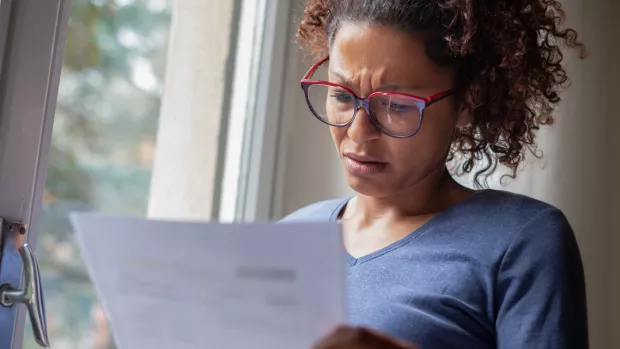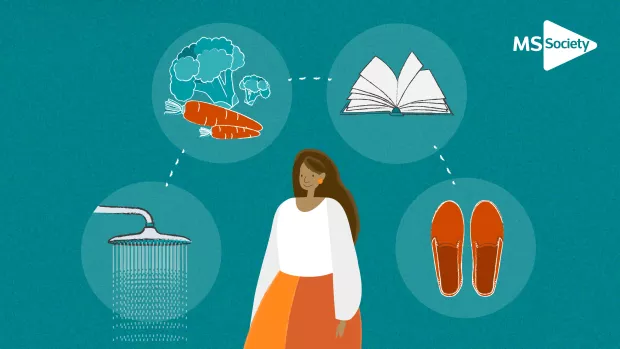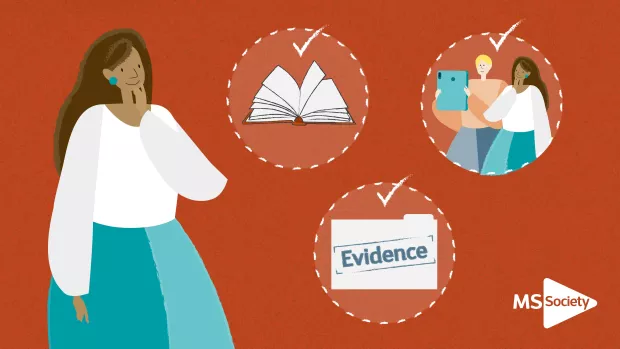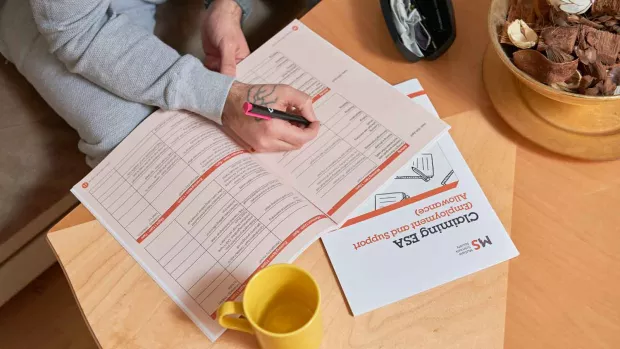Brief guide to benefits
The benefits system is complex, and the rules often change, so even if you’ve looked into it before, it might be worth checking again.
Across the UK, billions of pounds are unclaimed each year - make sure you get what you're entitled to.
Getting started
It's worth noting:
- Some benefits are affected by earnings, other types of income and the amount of savings or capital you (and sometimes your partner) have.
- As benefits can change, it’s worthwhile checking regularly to see if you’re claiming everything you’re entitled to.
- Some benefits are affected by a claimant's age, so check your entitlement when you, your partner or your children turn 16, 18, or reach State Pension age.
- If your circumstances change, your local Citizens Advice can help check what you're entitled to.
- If the symptoms of your MS get worse it's worth arranging a benefits check, particularly if any progression in your MS looks like it will be long-term.
- Many benefits overlap, so if you receive one there may be others that you can't get.
- It's worth checking how the benefit cap might affect you. It's a limit on the total amount of benefit that most people can get between 16 and State Pension age.
- The rules about some benefits may vary between England, Scotland, Wales and Northern Ireland.
MS Benefits Advice Service
Do you have a question about benefits? We can help. Our MS Benefits Advice Service offers free, confidential advice to people affected by MS, supporting people in England, Wales, Northern Ireland and Scotland.
You can get in touch with one of our MS benefits advisers by calling the MS Helpline on 0808 800 8000 or emailing [email protected]
Which benefits am I entitled to?
Disability benefits
Personal Independence Payment (PIP)
Personal Independence Payment (PIP) is designed to support the extra costs of living with a disability.
Adult Disability Payment is replacing PIP for most people in Scotland.
You can spend it on whatever you need, such as paying for support to remain independent during relapses, or to help with extra costs such as heating, transport or help around the house.
Some people with MS assume they can't get PIP because they're 'not disabled enough'. But as our MS benefits advisers explain in their PIP blog, it could mean extra money each month, so it's worth looking into.
PIP is replacing Disability Living Allowance (DLA) for people of working age.
Find out more about the switchover from DLA to PIP
Disability Living Allowance (DLA)
Disability Living Allowance (DLA) is a benefit for disabled children under 16 and some adults who already claim it. It can help with the extra costs of everyday care and getting around.
Adult Disability Payment is replacing DLA for most people in Scotland.
Under 16s in Scotland who already get DLA might be contacted by Social Security Scotland about Child Disability Payment. In areas where Child Disability Payment is available, 17-year-olds can also apply for that instead of DLA.
New claims for DLA are only for under 16s.
If you’re between 16 and State Pension age and you already get DLA, you’ll be reassessed for Personal Independence Payment (PIP) at some stage.
You don’t need to do anything until the Department for Work and Pensions (DWP) contacts you, or if your circumstances change and you need to let them know about that.
If you were 65 or over on 8 April 2013 and already getting DLA, you can carry on getting it for as long as you meet the conditions to qualify for it.
Everyone else currently claiming DLA will be reassessed for the new benefit at some point.
Find out more and apply for DLA at gov.uk
Find out more about the switchover from DLA to PIP
Child Disability Payment - Scotland only
Child Disability Payment is a benefit in Scotland for young disabled people under 18. It can help with the extra costs of everyday care and getting around.
It will replace Disability Living Allowance (DLA). But this isn’t happening straight away in most areas. At the moment, new claims should still be made for DLA, unless you’re in a ‘pilot area’. The first of these pilot areas are Dundee City, Perth and Kinross and Western isles, starting from 21 July 2021.
If you already get DLA for a child in Scotland, you don’t need to do anything about this change until Social Security Scotland writes to you.
They’ll write to parents and guardians to say the change is happening shortly before the child turns 16.
Find out more and apply for Child Disability Payment at mygov.scot
Attendance Allowance
If you’ve reached the State Pension Age and you have care needs, you might be able to claim Attendance Allowance. You don’t have to be getting help already. It’s the help you need that’s important.
If you started getting Disability Living Allowance (DLA) or Personal Independence Payment (PIP) before you reached State Pension age, you won't need to switch to Attendance Allowance.
Citizens Advice have information about applying for Attendance Allowance and filling in the forms
Carer's Allowance
If you're 16 or over and spend at least 35 hours a week looking after someone with MS, you might be able to claim Carer’s Allowance.
If you claim Carer’s Allowance it can affect other benefits either you or the person you care for may be claiming, so it's worth getting advice before claiming.
Unable to work
Statutory Sick Pay
Statutory Sick Pay is paid by your employer if you're too ill to work. It may be relevant if you have a job but are unable to work because of a relapse. It can be paid for up to 28 weeks.
You might be able to get Statutory Sick Pay if you’re advised to isolate because of COVID-19. If you’re advised to ‘shield’, you might also be able to claim while shielding measures are in place.
Once Statutory Sick Pay ends, or if you aren’t eligible for it because you're unemployed or self-employed, you may be able to claim 'new style' Employment and Support Allowance.
Find out more about statutory sick pay on the gov.uk website
Employment and Support Allowance (ESA)
Employment and Support Allowance (ESA) is a benefit paid if your ability to work is limited by ill health or disability.
You might also be able to get ESA if you can’t work when you ‘shield’ or self-isolate because of COVID-19.
Because ESA has changed in recent years, it’s called ‘new style’ ESA for new claims. Another kind of ESA, called ‘income-related’ ESA is being replaced by Universal Credit.
See our page about 'new style' ESA and how to claim it
Universal Credit
Universal credit has replaced several benefits, for most people. You might be able to claim this instead of, or as well as, different kinds of ESA. But before you make any claim, find out more about Universal Credit to make sure you make the right choices for you.
Able to work
Universal Credit
Universal credit has replaced several benefits, for most people. You might be able to claim it even if you are able to work. But before you make any claim, find out more about Universal Credit to make sure you make the right choices for you.
Jobseeker’s Allowance (JSA)
You can apply for ‘new style’ Jobseeker’s Allowance (JSA) to help you when you’re looking for work.
Another kind of JSA, called ‘income-based’ JSA is being replaced by Universal Credit.
If you already get 'income-based' JSA, or the other older kind of JSA ('contribution-based') you’ll keep getting payments while you’re eligible until your claim ends.
Find out more and make a claim for Jobseeker's Allowance at gov.uk
Employment and Support Allowance (ESA)
You can apply for Employment and Support Allowance (ESA) if a disability or health condition affects how much you can work.
You can claim if you’re in or out of work. But while you claim there are limits to the wages you can earn. And usually you can only work less than 16 hours a week. If you plan on doing any work while you claim ESA, speak to a benefits adviser so you know how it will affect you.
See our page about ESA and how to claim it
Working Tax Credit
You can only make a claim for Working Tax Credit if you already get Child Tax Credit.
It's extra money if you’re on a low income and you usually work. Some self-employed people can claim.
If you can't claim Working Tax Credit, you might be able to claim Universal Credit.
Or if you and your partner are over State Pension age, you might be able to apply for Pension Credit instead.
Read more about Working Tax Credit at gov.uk
Access to Work
Access to Work is a government scheme to help pay for any extra equipment or support you need as a result of your MS, so you can do your job.
This could be to help you start work, stay in work, or move into self-employment.
Home and bills
Housing Benefit
Housing Benefit can help you pay your rent if you’re not in work, or your income is low.
In Scotland, if you rent from a private landlord, the benefit is called Local Housing Allowance.
For most people, Housing Benefit is being replaced by Universal Credit.
You can only make a new claim for Housing Benefit if you've reached State Pension age or if you’re in supported, sheltered or temporary housing.
Find out more about Housing benefit on the gov.uk website
Help to pay Council Tax and rates
In England, Wales and Scotland, most households have to pay Council Tax. In Northern Ireland, households pay rates.
Some people don’t have to pay Council Tax or rates, including full-time students and people with a severe mental impairment.
If you do have to pay council tax or rates, you might be able to reduce the cost. There could be a number of ways to do this. For example if:
- you're the only adult in your home, or live with someone who wouldn't themselves need to pay (for example a full-time student)
- you’re out of work
- you're on a low income
- you can show that because of your MS or another condition you’ve made certain adaptations to your home, or you need to live in a larger home than you would otherwise.
Find out more about Council Tax reduction from gov.uk
Find out about help to pay your rates from the Northern Ireland government website
Payments towards fuel costs
If you’re on certain benefits, you might get help to pay your heating bills. There are 2 main schemes: Cold Weather Payments and Winter Fuel Payments. There are also schemes to help cut the costs of heating.
Read more about payments for fuel costs and saving on heating
Help from your local council
You might be able to get help directly from your local council, as well as any benefits you're entitled to.
Find out more about help from your local council
Savings and support with the everyday cost of living
You might find savings and support to help with the everyday cost of living. For example, with transport, heating, prescriptions and period products.
The benefit cap
The benefit cap is a limit on the total amount of benefit that most people get, if they’re aged between 16 and State Pension age.
So because of the benefit cap, there’s usually a weekly limit on how much you can get in total for these benefits:
- Bereavement benefits (including Bereavement Allowance and Widowed Parent’s Allowance)
- Carer’s Allowance
- Child Benefit and Guardian’s Allowance
- Child Tax Credit
- Housing Benefit
- Incapacity Benefit
- Employment and Support Allowance (ESA), unless you get the support component
- Income Support
- Jobseeker’s Allowance
- Maternity Allowance
- Severe Disablement Allowance
But you won’t be affected if you or anyone in your household qualifies for Working Tax Credit (or would do but your earnings are too high) or gets certain benefits, including:
- get Universal Credit because of a disability or health condition that stops you from working (this is called ‘limited capability for work and work-related activity’)
- get Universal Credit because you care for someone with a disability
- Disability Living Allowance
- Personal Independence Payment
- Attendance Allowance
- ESA, if you get the support component
If you’re getting benefits and could be affected by the cap, the DWP will contact you. They’ll let you know what will happen to your benefits.
Find out more about how the benefit cap could affect you at gov.uk
Further information
Online or by post
You can download the MS Society publication Benefits and MS or visit the gov.uk page about benefits for more details on benefits you may be entitled to.
Social Security Scotland has information on benefits including those unique to Scotland
Advice NI can help with benefits advice in Northern Ireland
There are a number of online sources of information and benefits checkers that can help you to find out which benefits you may be able to claim:
In person or by phone
Your local MS Society group will also be able to give you information on benefits and other sources of support locally. However, they can't give specific advice on individual benefits.
It's often worth seeking expert advice from a benefits adviser, such as those available at your local Citizens Advice. They can also help you filling in forms.
In Scotland your council's health and social care department should offer you a benefits check as part of a care needs assessment. Citizens Advice and other welfare rights services can also do checks.
Find your local money advice or welfare rights service through Citizens Advice Scotland.
In Northern Ireland, Advice NI can help you find local benefits advice
Last full review:
We also update when we know about important changes.




